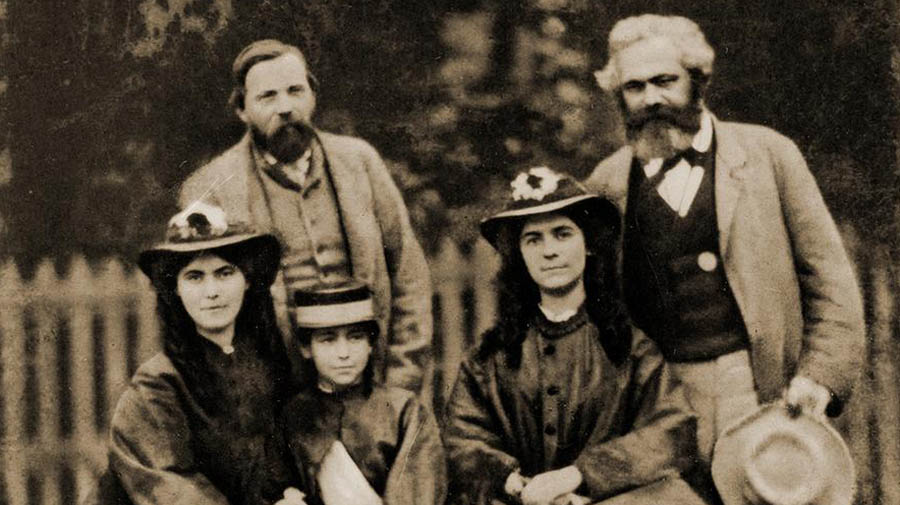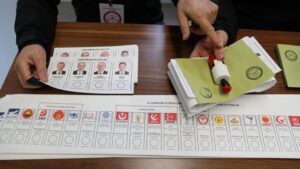
May 5, 2023
May 5 marks the birth anniversary of K. Marx, the founder of scientific socialism. We hereby publish a short biography, written by his close collaborator and comrade F. Engels in 1892. Engels gives a general outline of Marx’s life, work and forced immigration from country to country as he was expelled by different governments due to his political activity. At the same time he makes clear that the picture painted by some that Marx was just a ‘theoretician’ does not stand a reality check: Marx was constantly involved in the labour movement developments and was striving to build the forces of socialism.
Source: Marxists Internet Archive
Marx, Heinrich Karl, was born in Trier on May 5, 1818, the son of the lawyer and later counsellor of justice Heinrich Marx, who, as is shown by the baptismal certificate of his son, converted with his family from Judaism to Protestantism in 1824. After concluding his preparatory education at Trier Gymnasium, Karl Marx studied from 1835 in Bonn and then in Berlin, first law and later philosophy, attaining his Dr. Phil. in Berlin in 1841 with a dissertation on the philosophy of Epicurus. In the same year he moved to Bonn in order to qualify as a lecturer, but the obstacles which the government laid in the path of his friend Bruno Bauer, officially there as lecturer in theology, which culminated in Bauer’s removal from the university, soon made it clear to him that there was no room for him at a Prussian university. This was the time when the younger elements of the radical bourgeoisie of the Rhineland, tinged with Young Hegelianism, urged, in agreement with the liberal leaders Camphausen and Hansemann, the publication of a big opposition paper in Cologne; Marx and Bauer were also consulted as capable main contributors. A concession — necessary at that time — was quietly obtained by a devious route, and the Rheinische Zeitung appeared on January 1, 1842. Marx contributed lengthy articles from Bonn for the new paper; foremost among these were: a critique of proceedings in the Rhine Province Assembly, a study of the situation of the peasant vintners on the Mosel, and another on wood theft and the relevant legislation. In October 1842 he took over the management of the paper and moved to Cologne. From this point the paper adopted a sharply appositional character. But the management was so adroit that despite first double censorship, and then triple censorship, imposed upon the paper (first the ordinary censor, then the Regierungspräsident, and finally a Mr. von Saint-Paul dispatched ad hoc from Berlin), the government found this sort of newspaper hard to deal with and therefore decided to forbid further publication of the paper as of April 1, 1843. Marx’s resignation from the editorial board on this date bought a three months’ stay of execution, but then the paper was finally suppressed.
Marx then decided to move to Paris where Arnold Ruge also wished to turn, following the suppression of the Deutsche Jahrb Cher at about the same time. But first in Kreuznach he married Jenny von Westphalen, sweetheart of his youth, to whom he had been engaged since the beginning of his university days. The young couple reached Paris in the autumn of 1843, and here Marx and Ruge published the Deutsch–Französische Jahrbücher, a journal of which only the first issue appeared; a continuation failed, partly because of the insuperable difficulties of circulating it secretly in Germany, and partly because of the differences of principle which very soon became apparent between the two editors. Ruge remained tied up with Hegelian philosophy and political radicalism, while Marx threw himself into the study of political economy, the French socialists, and the history of France. The result was his conversion to socialism. In September 1844, Fr. Engels visited Marx in Paris for a few days: the two had been in correspondence since their joint work, on the Deutsch–Französische Jahrbücher, and their collaboration, which only ended with the death of Marx, dates from this point. The first fruit of this collaboration was a polemical pamphlet against Bruno Bauer, with whom they had likewise parted ways on principles in the course of the disintegration of the Hegelian school: The Holy Family, or Critique of Critical Criticism. Against Bruno Bauer and Company, Frankfurt a. M., 1845.
Marx helped to edit a small German weekly called Vorwärts!, published in Paris, which poured biting scorn op the wretchedness of the German absolutism and sham constitutionalism of the time. This prompted the Prussian Government to demand that Guizot’s ministry expel Marx from France. It was agreed: in early 1845 Marx moved to Brussels, and Engels arrived there soon afterwards. Here Marx published The Poverty of Philosophy. Answer to the “Philosophy of Poverty” by M.Proudhon, Brussels and Paris, 1847, and also “Speech on the Question of Free Trade”, Brussels, 1848. In addition he wrote occasional articles for the Deutsche-Brüsseler-Zeitung. In January 1848 he drew up, together with Engels, the Manifesto of the Communist Party on the instructions of the Central Authority of the Communist League, a secret propaganda society which Marx and Engels had joined in the spring of 1847. The Manifesto has since appeared in innumerable authorised and unauthorised German editions and been translated into nearly all European languages.
On the outbreak of the 1848 February Revolution, which brought about popular movements in Brussels too, Marx was arrested and expelled from Belgium; in the meantime the Provisional Government of the French Republic had invited him to come back to Paris, so he returned there.
At first in Paris he and his friends took a stand against the game of forming legions, which gave the majority in the new government a simple means of ridding themselves of the “tiresome” foreign workers. It was clear that such openly organised Belgian, German, etc., legions would only be able to march across the frontiers into a well-organised trap, and this was indeed the case. Marx and the other leaders of the Communist League obtained for about four hundred unemployed Germans the same travel allowance as the legionaries, so that they too could return to Germany.
In April Marx went to Cologne, and on July 1 the Neue Rheinische Zeitung was published there under his management; it appeared for the last time on May 19 the following year. The editors were either threatened with judicial arrest or with expulsion as non-Prussians. The latter fate befell Marx, who during his time in Brussels had taken his release from the Prussian state. During the existence of the paper he had to appear twice before the jury, on February 7, 1849, because of a press misdemeanour, and on the 8th on charges of incitement to armed resistance to the government (at the time of the tax refusal, November 1848); both times he was acquitted.
After the paper had been suppressed Marx returned to Paris, but after the demonstration of June 13 he was faced with the choice of either allowing himself to be interned in Brittany or of turning his back on France once again. He naturally chose the latter and moved to London, where he now finally established his residence.
In London he published: the Neue rheinische Zeitung. Politisch-ökonomische Revue, Hamburg, 1850, of which six issues appeared.
His main work there was 1848 to 1849 [The Class Struggles in France, 1848 to 1850], an account of the causes and the inner connection of the events of these years, particularly in France; also (together with Engels) reviews and political résumés. The former work was soon followed by the continuation, The Eighteenth Brumaire of Louis Bonaparte, New York, 1852, reissued in Hamburg in 1869 and 1885. The big Communist trial in Cologne gave rise to a further pamphlet, Revelations Concerning the Communist Trial in Cologne, Boston, 1853, latest edition Zurich, 1885. From 1852 onwards Marx was London correspondent of the New-York Tribune, and for years virtual European editor. His articles are in part signed with his name, and in part published as editorials: they are not ordinary articles, but extensive accounts of the political and economic position of the various countries of Europe, based upon thorough study, and often constituting a whole series of articles. The military essays amongst them, on the Crimean War, the Indian Rebellion, etc., are by Engels. Some of Marx’s articles on Lord Palmerston were reprinted in London in pamphlet form. His work for the Tribune only came to an end with the American Civil War.
The year 1859 involved Marx, on the one hand, in a polemic with Karl Vogt arising from the Italian War, which found its conclusion in Herr Vogt by Karl Marx, London, 1860. But on the other hand, it brought the first fruits of his years of economic studies in the British Museum in the form of Part One of A Contribution to the Critique of Political Economy, Berlin, 1859. This Part One had scarcely been published when Marx discovered that he was not yet completely clear about the detailed execution of the basic ideas of the subsequent parts; the manuscript, which is still extant, is the best proof of this. So he immediately started again from the beginning, and so, instead of the continuation, Capital was published in 1867. Book One: The Process of Production of Capital, Hamburg, 1867.
While he was working on all three volumes of Capital — the second and third volumes at least in draft — Marx finally again found an opportunity for practical work in the world of labour. In 1864 the International Working Men’s Association was founded. Many people, in particular Frenchmen, have arrogated to themselves the honour of having been founders of this Association. It is obvious that something like this cannot be founded by one person alone. But one thing is certain: amongst all those participating there was only one who was clear about what had to be done and what had to be founded; and this was the man who back in 1848 had flung the call to the world: Workingmen of all lands, unite!
At the foundation of the International Giuseppe Mazzini too attempted to win and utilise the elements coming together for his mystical conspiratorial democracy Dio e popolo. But the drafts for the statutes and the Inaugural Address submitted in his name were rejected in favour of those edited by Marx, and from this point Marx was sure of the leadership of the International. He wrote all the promulgations of the General Council, including most notably The Civil War in France which appeared after the fall of the Paris Commune and was translated into most European languages.
This is not the place to relate the history of the International. It is enough to say that Marx was able to draft statutes with principled motivation under which French Proudhonists, German Communists and English New Trades Unionists could work together in unity, and that nothing disturbed the harmony of the Association until there appeared on the scene those people who have since then attempted to disrupt every workingmen’s movement, the anarchists under Bakunin. It is clear that the strength of the Association lay solely in the previously unheard-of attempt to unite the European and American proletariat; the General Council had no means but moral ones, not even funds; instead of the fabled “millions of the International” it generally had only debts. Never, probably, has so much been achieved with so little money.
After the Commune, the International became impossible in Europe. To continue in the previous form the struggle against the governments and against the bourgeoisie, which was equally excited in all countries, would have demanded enormous sacrifices. Then there was the struggle inside the Association itself against the anarchists and the Proudhonist elements sympathising with them. Le jeu ne valait pas la chandelle [The game was not worth the candle]. So after formal victory over the anarchists had been achieved at the Hague Congress, Marx proposed that the General Council be moved to New York.
The continued existence of the Association was thus guaranteed in case changed conditions made necessary its re-establishment in Europe. When, however, such conditions emerged, the old form was outdated; the movement had far outgrown the old International.
From this time Marx stayed aloof from public agitation, but this is not to suggest he was any less active in the European and American working-class movement. He was in correspondence with almost all the leaders in the various countries, who, whenever possible, consulted him on important matters; he increasingly became the much-sought-after and ever-willing adviser of the valiant proletariat. But despite all this, Marx was now able to devote himself once more to his studies, the field of which had greatly expanded in the meantime. For a man who checked every subject for its historical origin and its preconditions, every single question naturally produced whole series of new questions. Pre-history, agronomy, Russian and American landownership relations, geology, etc., were combed, in particular to work out, to an extent hitherto never previously attempted, the section on ground rent in Book III of Capital. In addition to all the Germanic and Romance languages, which he read with ease, he also learned Old Slavonic, Russian and Serbian. Unfortunately increasing illness prevented him from utilising the material so collected. On December 2, 1881 his wife died, on January 11, 1883 his eldest daughter, and on March 14 of the same year he passed away quietly in his armchair.


